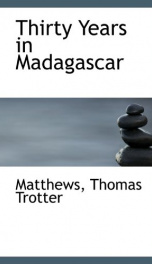thirty years in madagascar

Purchase of this book includes free trial access to www.million-books.com where you can read more than a million books for free. This is an OCR edition with typos. Excerpt from book: CHAPTER II 'THE KILLING TIMES' ' Yea, and all that will live godly in Christ Jesus shall suffer persecution.'2 Tim. iii. 12. THE edict of Queen Ranavalona I against the Christian religion was published on March 1, 1835. To effect a return to absolute heathenism at all costs was the settled policy of the queen and her advisers. Christianity and heathen barbarism could not exist together. Very soon, however, to the astonishment of the queen and her advisers, it was found that although the missionaries had been expelled, and the Bible and other religious books burned, a stop had not really been put to the 'praying.' They had not been able to expel the Spirit of God from the hearts of the people. The good seed of the Kingdom began through persecution to strike its roots deeper, and under the influence of the dews of Heaven to spring up and yield fruit. Midnight prayer-meetings were begun in the capital itself, within gun-shot of the palace. At one of those midnight prayer-meetings, when discovery meant certain death, a young man, Razaka, and his wife from Vonizongo were baptized. He had been a scholar in the mission school at Fihaonana, and afterwards became the native pastor of the mother-church at Fihaonana, which office he held for more than twenty years. Not only so; he became the ApostleSevere Persecution 43 of Vonizongo, and founded some forty of the village congregations in that district. The queen, thus thwarted, became more incensed than ever, and severer measures were resorted to in order to exterminate the hateful' praying.' Death was the penalty of the slightest act of disobedience; but still the people continued to pray, and the Kingdom of God to make quiet but sure progress. The queen discovered, as other persecutors had done before, that the more she per...
Info about the book
Author:
Series:
Unknown
ISBN:
1150955791
Rating:
5/5 (3)Your rating:
0/5
Languge:
English
Users who have this book
Users who want this book
What readers are saying
What do you think? Write your own comment on this book!
write a commentif you like thirty years in madagascar try:
Other books by this author
Do you want to exchange books? It’s EASY!
Get registered and find other users who want to give their favourite books to good hands!


